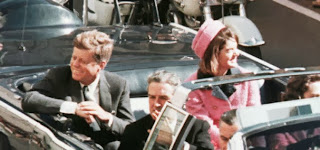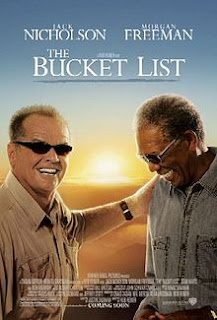"Where Were You When You Heard . . .?"
I am a bona fide Kennedy-phile. Whether in books, movies or on TV, stories of the triumphs and tragedies of this American family have received my attention and interest since I was a teenager. And then this past month, as the 50th anniversary of JFK's assassination neared, my focus sharpened again to that fateful day in Dallas. Morbidly, I spent some time yesterday watching the scant few moments of gruesome film footage before, during and after the fatal shot that ended the President's life.
The Kennedy Presidency was never part of my conscious memory. I was born three years after it ended. And yet each time I read about or watch this moment in U.S. history unfold in books or onscreen, I have found myself growing anxious as the story moves inexorably toward 12:30pm, CST on November 22, 1963. "Maybe this time the big black Lincoln won't turn right onto Elm," a voice in the back of my mind whispers hopefully. "Maybe this time Oswald will miss. Maybe this time . . ."
But the car doesn't, and neither did Oswald. And history continues.
So, a person who was my present age in late November 1963 added a third collective memory to the nation's consciousness - the ability to recall exactly where they were when they heard tragic news of national or global significance. Before the President's assassination, there was the Japanese attack on Pearl Harbor in December 1941, followed by news of Franklin Roosevelt's death in April 1945. One marked U.S. entry into a global conflict; the other the death of a President who had held the office for so long that many Americans could scarcely remember any other.
But - again - history continues.
After a brief scan of the past 100 years, I realized that the "Where were you when you heard . . ." phenomenon has seemed to apply exclusively to tragedies rather than successes. The one exception to this rule, however, would undoubtedly be when people worldwide heard of the surrenders of both Germany and Japan, bringing World War II to a close. Strange though, that I've never heard anyone use the expression when sharing their recollection of these two events.
Nonetheless, the hallmark quality of a "Where were you when you heard . . ." event is that it is felt on a deeply personal level by millions of people. But how could that be? Although approximately 2,000 lives were lost at Pearl Harbor, most Americans didn't actually know any of those men as individuals. And Roosevelt and Kennedy - for all of their appeal - were liked and disliked during their Presidencies in nearly equal measures by the voting public.
So why then did these three events (and the six that would follow) sear themselves into America's collective memory?
I would posit that Americans remember where they were when they hear traumatic news is because an almost subconscious understanding emerges in the national psyche that nothing will be the same again - changes are coming and their affect will be widespread. The attack on Pearl Harbor meant war - a war that would require sacrifices both at home and overseas. Roosevelt's passing was akin to the loss of a trusted parent. Who would lead America safely through the wilderness? And Kennedy's murder seemed like the death of youth itself. Though no one can guess how a 2nd term would have gone for JFK, a glance at the latter half of the 60's under Johnson and Nixon reveals a deeply divided country. Optimism, always a stalwart American trait disappeared as the Vietnam War dragged on. The nation hasn't completely recovered since.
Of the other six events that followed in which almost all Americans can remember where they were when they heard, four happened specifically to Americans who were admired, even loved. They were:
1. The assassination of Martin Luther King in April 1968. King's killing, as Senator Robert Kennedy said in an impromptu eulogy given that same April evening, should cause all Americans to ask "what kind of nation we are and what direction we want to move in . . ." Ever the poet, RFK concluded by urging Americans to "tame the savageness of man and make gentle the life of this world." Fitting words to honor a martyred prophet's work.
2. The assassination of Robert Kennedy. Scarred and adrift after his older brother's murder, RFK's journey of self-discovery from late 1963 until June 5, 1968 mirrored the nation's own, as he and the United States came to grips with the folly in Vietnam. After pursuing a path of peace and emerging as the likely Democratic nominee, the Senator was gunned down in Los Angeles after winning the California primary. Exhausted after a third assassination in five years, Americans could only weep helplessly after this final loss.
3. The assassination attempt of Ronald Reagan. With the psychological wounds from Vietnam still fresh, Reagan and three others were shot at close range by a lone gunman on March 30, 1981. Not yet widely admired, Reagan's good humor following the shooting went a long way towards shaping his image in the public's mind as an optimist who believed America's best days were still ahead.
4. The Challenger Disaster. By 1986, space flight had become so routine to most Americans that shuttle launches were no longer carried live on TV, nor did they garner much attention. The Challenger launch that January was an attempt to re-ignite public interest by including a civilian, teacher Christa McAuliffe, who would run tests in orbit as well as give a lesson to schoolchildren back on Earth. Instead, after NASA reported a "major malfunction" 73 seconds after lift-off, Americans were brutally reminded that space was still a very dangerous place.
5. The HIV+ announcement of Earvin "Magic" Johnson. Although not a national tragedy, Johnson's very public announcement shook the entire nation. Everyone's initial thoughts were along the lines of, Oh, he is going to waste away and die soon. HIV and AIDS were not new, but the news of the smiling, ebullient "Magic" plagued with what was then assumed to be a death sentence was impossible for the American public to easily swallow in late 1991.
6. The 9/11 Terror Attacks. Of course, for people between the ages of 20 and 50, the mother of all "Where were you when you heard . . ." events occurred in 2001. Our Pearl Harbor. Our Kennedy Assassination. We all instantly remember. Two wars later and a surveillance net that seems to now cover the globe, no one can recall any longer - much less imagine - what feeling completely safe feels like.
The only redeeming after-effect of any of these tragic events is people's unspoken need for community. With no answers forthcoming to the repeating question, "Why did this happen," we have continually turned to our only constant source of comfort and security - each other. Human nature asserting itself.
Though we haven't had a "Where were you when you heard . . ." event in over twelve years, we certainly live in troubling times. The chasms that divide Americans have created a mean-spiritedness that appears to be hardening into permanence. We would be wise to remember that we have much more to lose together than we have to gain separately. We shouldn't have to endure another "Where were you when you heard . . ." tragedy to realize this. As Robert F. Kennedy so presciently said two months before his death:
"What we need in the United States is not division; what we need in the United States is not hatred; what we need in the United States is not violence and lawlessness, but is love, and wisdom, and compassion toward one another, and a feeling of justice toward those who still suffer within our country . . . "









Bergy,
ReplyDeleteHow can two guys with different political views agree on so much?
Although not exhaustively researched, my general belief is that 1968 has been the most turbulent year in my lifetime. Not only were Kennedy and King assassinated, Tommie Smith and John Carlos protested at the summer olympics, the Tet Offensive bagan (and misreported), the My Lai massacre occured (but not reported for at least a year) and the US went off the gold standard (soemthing we are still suffering from). A year filled from beginning to end with heaviness and sadness.
Of course 1968 wasn't all bad. A little group called Led Zepplin was introduced to the world, so we had that going for us.
As for other "Where were you when..." moments, Kirby Pucket's retirement announcement and O.J's bronco chase always come to mind.
I forgot about the Bronco chase - I was watching the NBA playoffs (LA v. Houston I think) and Bob Costas told us they were going away from the game to cover the insanity. Thanks for the memories OJ - you murderous nutjob. Can't remember Puck's announcement.
Delete